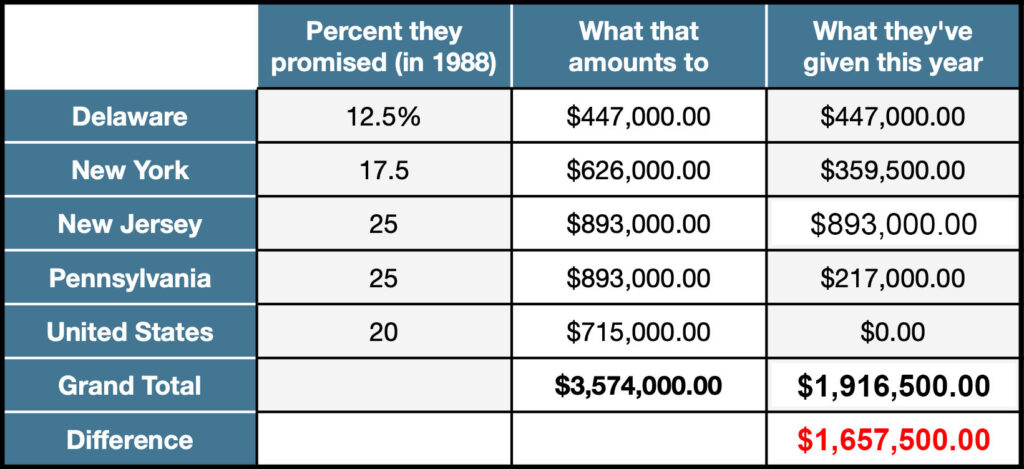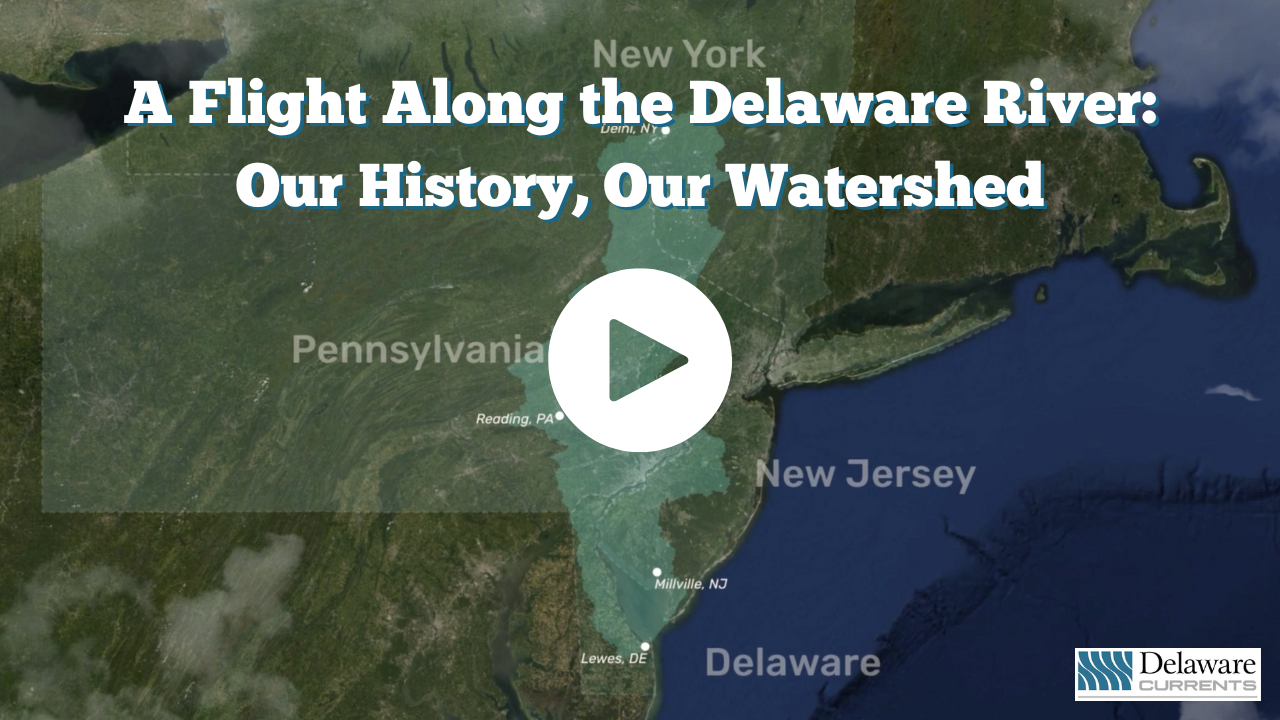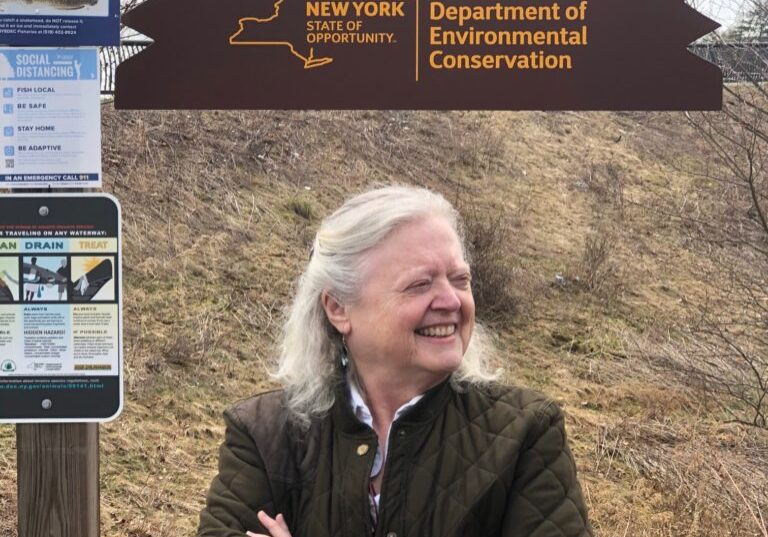
Full funding for the DRBC inches closer
Editorial Report
| August 2, 2021
So, the good news? New Jersey has finally owned up to its responsibility to fund the Delaware River Basin Commission at $893,000.
To review: The Delaware River Basin Commission is the regulatory agency charged by the four river states — New York, Pennsylvania, New Jersey and Delaware — and the federal government to be “in charge” of the river’s water quality and quantity (think floods and droughts).
Back in 1988, all those parties agreed to a base line funding totaling $3,574,000.

Short sad story? The aggregated funding has never reached those levels. The closest it came was in 2009 when it reached $3.3 million — the last time the federal government gave anything. Since then, nothing from the federal government. For that matter, 2009 was the first time the federal government had given any money to the DRBC since 1997.
Here’s the record of funding for the DRBC since 1963, shortly after it was created.
The lowest total figure happened fairly recently in 2020: $1,594,755, less than half.
And this when the watershed is facing the effects of climate change, as well as a welcome interest in the health of the river from residents all over the basin.
The state of Delaware has been the only funder that has consistently given its “Fair Share” of $447,000.

Pennsylvania’s Governor Tom Wolf has been including the state’s full share in his budgets but the state’s legislature has whittled it down, likely reflecting the legislature’s displeasure with the DRBC’s decision banning fracking in the watershed.
It’s also possible that only some legislators hold that opinion. Many of them likely remain largely ignorant of the vital role the DRBC plays to help uphold water quality standards for the many municipalities that use the river as their drinking water source — and that includes Philadelphia.
Also, though all four basin states have Democratic governors, only Pennsylvania has a Republican-controlled legislature.
The DRBC has been been on a mission to increase understanding of its role by state legislators around the watershed as well as members of the U.S. Congress. The latter is especially important to advance legislation to shift the path of federal funding and turn those federal taps on.
Right now, the money from the federal government comes through a convoluted budget process that starts with its representative on the DRBC — the U.S. Army Corps of Engineers.
As the DRBC’s Director of External Affairs and Communications Peter Eschbach puts it, the local and regional offices of the USACE are fully supportive of the role of the DRBC, but its budgeting process ends up in the arms of the Department of the Army and its convoluted process fails to achieve the funding goals for the DRBC.
There have been attempts to find a different pathway for that funding, possibly through the Environmental Protection Agency, but that takes legislation and for that, perhaps the newly created bipartisan Delaware River Watershed Congressional Caucus, will gather the energy of the 22 (yes, that many) U.S. representatives whose districts are, at least partly,
in the watershed.
The roll call of supporters, so far, includes of course the two representatives who formed the caucus: Democrat U.S. Rep. Antonio Delgado (NY-19) and Republican U.S. Rep. Brian Fitzpatrick (PA-1).
Here’s the story about its launch in April of this year.
Signed on so far (13, just over half):
From New York (the full complement of New York’s Delaware River representatives):
U.S. Rep. Sean Patrick Maloney (D. NY-18)
U.S Rep. Claudia Tenney (R. NY-22)
From Pennsylvania:
U.S. Rep. Mary Gay Scanlon (D. PA-5)
U.S. Rep. Brendan Boyle (D. PA-2)
U.S. Rep. Susan Wild (D. PA-7)
U.S. Rep. Chrissy Houlahan (D. PA-6)
U.S. Rep. Madeleine Dean (D. PA-4)
U.S. Rep. Matt Cartwright (D. PA-8)
From New Jersey:
U.S. Rep Chris Smith (R. NJ-4)
U.S. Rep. Josh Gottheimer (D. NJ-5)
From Delaware:
U.S. Rep. Lisa Blunt Rochester (D.-At large)
The Delaware River Basin Commission has its supporters and detractors all over the watershed. But as we face the effects of climate change, it provides — in its various advisory committees– a place where different points of view are expressed and better understood.
We all benefit when all points of view are understood.


![DC_Image [Image 4_Assunpink Meets Delaware] meets Delaware The Assunpink Creek on its its way to meet the Delaware River. The creek passes through woods, industrial and commercial areas and spots both sparkling and filled with litter.](https://delawarecurrents.org/wp-content/uploads/bb-plugin/cache/DC_Image-4_Assunpink-meets-Delaware-1024x768-landscape-14f069364113da5e8c145e04c9f2367c-.jpg)



